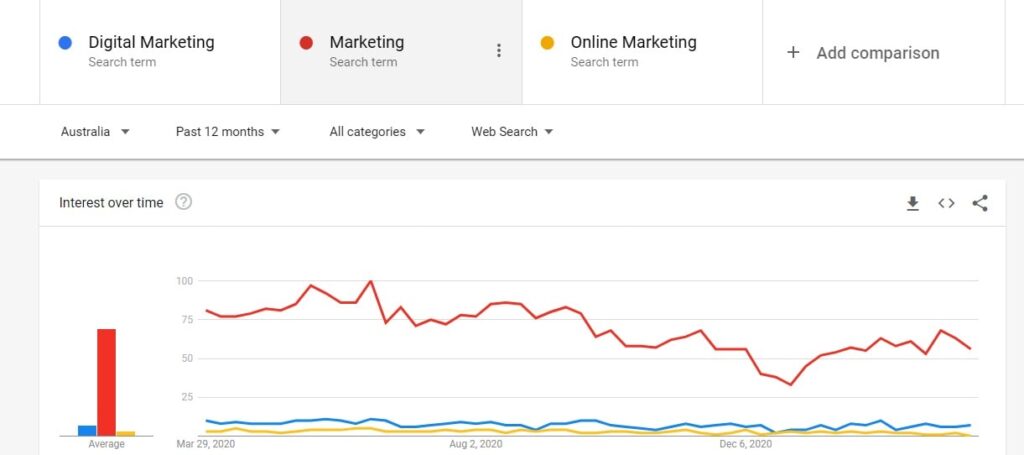Your business is showing up in search results, but how can you improve your ranking or move ahead of your competitors? With keyword research! When it comes to search engine optimisation (SEO), you’ll want to find keywords that online consumers are searching for that way you can use them in your website content. Not sure where to begin? This blog will be your source for keyword research basics, including a keyword research template, competitor keyword research and Google Keyword Planner. Let’s get started!
What Is Keyword Research?
Before we get too far in, let’s define keyword research and why it’s important. Keyword research is the process of finding and analysing specific keywords that consumers search for on the web. Once found, you can use the data from your keyword research basics to implement in your marketing strategies, including content creation, website optimisation and SEO.
Keyword research is crucial to businesses as it tells you what consumers are searching for. Over time, what consumers search can change, which is why it’s important to do keyword research on a consistent basis. Or if your business undergoes a change, your target audience might change as well; this means you must do keyword research to understand what your new audience is searching for. Keep in mind that what you want your business to rank for and what consumers are searching for may be different. There’s a fine line you’ll want to meet to appease both your needs and consumer needs.
Regardless, keyword research basics is essential for businesses of all types. From healthcare providers to technology companies, businesses must allocate the time to perform keyword research. According to HubSpot, it’s best to revisit your keyword strategy once a quarter. If you’re planning any big campaigns or promotions, be sure to look at your keywords 3 to 6 months beforehand.
If you would like to learn how keyword research basics and SEO come together, head over to our blog to read about silo vs. cluster content in SEO strategies.
Getting Started With Keyword Research
When it’s time for you to begin keyword research, there are some steps you need to take before you jump to the internet.
Ask Questions
If you go into keyword research with no questions to answer, then what’s the point of completing the research? First, you need to understand keyword research basics and your target audience and ask questions relating to their searches. Here are some questions to consider:
- What products/services in my industry are people searching for?
- Who is searching for these products/services?
- When are people searching for these products services? Think season/time of year
- How are people searching for these products/services? Consider the words they use, questions they ask and if it’s mobile vs. computer dominated
- Why are people seeking this product/service?
- Where is the target audience located?
As you start researching, keep these questions in mind as they can help drive your keyword research basics and lead you to find better keywords for your content and website.
Make a List of Relevant Topics
In this step, you’ll want to think about your business as a whole and what you want to rank for. Create a list of 5 to 10 generic topics (they don’t have to be specific, that comes in a later step). Remember, you also need to consider what your target audience has searched for in the past. If it’s helpful, you can create two separate lists based on what you want your business to rank for vs. what your target audience wants. After both lists are created, then you can see what topics overlap.
After doing your initial list and keyword research, you should have a better understanding of what you want to rank for vs. your audience, so making two lists won’t always be necessary. As time goes on, you should begin to feel more comfortable and possibly not need this step if you’re just revisiting keywords.
Create Specific Keywords
Now that you have covered keyword research basics and have a generalized list of topics, you can begin to create sub-topics or specific keywords relating to those topics. For example, at Higher Ranking, if we were to do keyword research on SEO, a few specific keywords that would fall into that list would include local SEO, organic SEO, SEO vs. SEM and many others. If you need help figuring out keywords, simply do a Google search for some ideas.
While this step might seem like the final step of keyword research, it’s not! Think of these first 3 steps as a brainstorming session. Ultimately, you want a starting point of what you think online consumers are searching for and what you want to rank for.
Bonus Tip: Another important thing to note is that you need to consider the user intent behind the keyword. The keywords you place on your website should intend to solve a consumer’s problem rather than just live on the page to help your site rank in searches. Keywords can have many different meanings, so you need to understand the intent behind them as well.
Use Keyword Research Tools
Now that you have your list of general topics, specific sub-topic breakdowns, and you’ve considered the intent behind the keywords, it’s time to utilise a keyword research tool to your advantage. At Higher Ranking, we recommend using Google’s free Keyword Planner tool. When using Google Keyword Planner (or any that you choose), you will want to focus on average monthly searches and the competition level. The best practice for keywords research basics is to find keywords that are low to medium in competition while having a decent amount of search volume. If you have a long list of keywords that you want to rank for, Keyword Planner can help you cut down on some of the keywords that aren’t ranking well. Google offers forecasts and historical metrics as well. This allows you to see what has worked in the past and what’s to come in the future.
Another great option that you can use for your business is Google Trends. While trends do change over time, it can help you determine what keywords have been trending in comparison. This tool can help if you’re stuck between two different keywords that perform similarly in the Keyword Planner. Look at the image below as an example.

Over time, the keyword “Marketing” has performed drastically better than the keywords “Digital Marketing” or “Online Marketing.” If your business wanted to write a blog or have a webpage about marketing, using “Marketing” would be a better option as this is the keyword that’s trending. The keywords “Digital Marketing” and “Online Marketing” would be sub-topic keywords that you could supplement into your content.
If you are in a niche industry, it’s likely that your search volume and competition will be low, so you’ll have to think outside the box when it comes to keywords. It also means that you may need to do keyword research more often as you begin to rise in popularity. Don’t get discouraged, though! Keyword research basics, implementation and optimisation take time for businesses throughout all industries. Remember to be consistent and continue optimising as you go.
You’ve made it through the basic steps of your keyword research! If you’d prefer, you can use a keyword research template to keep you on track. Backlinko has a great template that’s free that you can use for your business. Click here to visit their site to download the template.
Tips for Choosing Good Keywords
While doing your keyword research, you may come across keywords that may or may not be worthwhile to your business. Not all keywords are good keywords. Your keywords must rank for three basic things:
- Relevance – Google looks at how relevant your content is. Search intent comes into play in this ranking factor. Content will only rank if it’s relevant to the searcher’s query. The more likely your content is to answer a question, the more likely it will rank higher.
- Authority – For Google to deem you as authoritative, your site must include helpful content that answers a searcher’s query. You must also promote your content in hopes of gaining backlinks.
- Search Volume – Is your content being searched for? It won’t matter if you’re appearing on the first page of a search if consumers aren’t searching for that product/service.
Another aspect you need to consider for good keywords is having a mix of short-tail and long-tail keywords. Short-tail keywords range anywhere from 1 to 3 words, while long-tail keywords are typically phrases or short sentences. Short-tail keywords are important for traditional searches done on a computer while long-tail keywords are more important for voice search. If you want to learn how to optimise your content for voice search, be sure to check out our blog here.
Why You Need to Complete Competitor Keyword Research
One other task you need to complete is competitor keyword research. Even though you don’t need to use the same keywords as your competitors, knowing their keywords can help you evaluate whether you need to update or change what keywords you focus on. If a competitor is using a keyword you want to rank for, you will want to improve your ranking.
There are three methods of keyword research basics to find out what keywords your competitors rank for. The first one is using an incognito window and manually searching keywords to see where your competitors fall in search rankings. The second option is finding an online source that allows you to run reports on specific domains. A great example of this is Ahrefs Keywords Explorer. The third option is using a digital marketing agency, like our team at Higher Ranking, to handle your marketing and keyword research needs.
Final Thoughts
While keyword research may seem tedious, it is an essential part of your online marketing strategy. Whether you’ve never completed keyword research or you’re a pro, every business needs to take the time every quarter to check or update the keywords they’re using.
Remember, keywords can change over time based on how online consumers are searching for products and services. Just because a keyword performed well in the past does not mean that it will continue to be a successful keyword in the future. If you notice your search rankings are decreasing, this could also be a sign that you need to check on your keywords. With all the free online keyword tools at your disposal, keyword research is easier than ever before.
As Google makes algorithm updates, it’s likely that ranking factors may change, too! Digital marketing is ever-evolving, and it’s crucial that your business stays ahead of the trends. When you work with our team at Higher Ranking, we can help with all your online marketing needs, including SEO, mobile advertising, social media and more. Click here to learn more about our services and begin on a path towards a higher ranking today!










